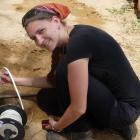
Programme Officer
Mélanie is a water and sanitation engineer working in the WASH sector since 2002. She worked 5 years in the private sector in hydraulic design and construction followed by 7 years in the humanitarian and development sector. Mélanie has an extensive field experience as WASH programme manager and coordinator mainly in emergency contexts, and was based and worked in various countries in Africa, Asia and the Middle East.
She joined IRC in 2012 as a Programme Officer and has been involved in various research and monitoring initiatives, mainly in the field of sanitation, hygiene and MUS (Multiple Use of water Services). Mélanie is the facilitator of the online life-cycle costing training and is working with UNCHR to adapt the life-cycle cost approach to emergency contexts.
Languages: English, German, French, Spanish
Achievements and key messages from the USAID Transform WASH programme (2017 to 2023) in Ethiopia. Read more...
Achievements and key messages from the USAID Transform WASH programme (2017 to 2023) in Ethiopia. Read more...
Les sources de données sont nécessaires pour fournir des preuves. Comment les données peuvent-elles être utilisées pour la planification et la... Read more...
Data sources are necessary to provide evidence. How can data be used for planning and accountability? Read more...
Que faut-il faire pour aller au-delà de la cartographie des installations WASH et utiliser réellement les données pour la prise de décision et la... Read more...
What does it take to successfully go beyond mapping WASH facilities to actually using data for national-level decision making and accountability? Why... Read more...
Accueil et mise en scène du dialogue de haut niveau sur les défis du renforcement des systèmes WASH en Afrique Read more...
Welcome and scene setting high-level dialogue on challenges of strengthening WASH systems in Africa Read more...
Ministry of Water and Energy (Ethiopia), COWASH, SNV and IRC reflecting on partnership work in Ethiopia Read more...
Recommendations for hand hygiene in public places and institutions; hand hygiene in the local governance process; hand hygiene promotion strategy;... Read more...
How do multi-stakeholder partnerships differ across thematic areas and how have they evolved over the last decade. Read more...
A costed strategic approach towards achieving improved sanitation services for households and institutions and the entire service chain. Read more...
Ensuring proper handling of human waste both within the households and institutions. Read more...
Achieving universal access to sustainable sanitation for a clean, healthy and productive urban environment by 2040 through active participation of... Read more...
Achieving a healthy tourism town with universal access to sustainable sanitation and an improved community livelihood for all by 2040 through... Read more...
Recommendations on coordination of initiatives and professionalisation of rural water supply maintenance. Read more...
Why is self-supply important and what can WASH professionals, governments, academia, funders and implementers do to help self-supply reach its... Read more...
The leveraging experience has opened new windows of opportunity for better collaboration and partnerships between NGOs and government, and may... Read more...